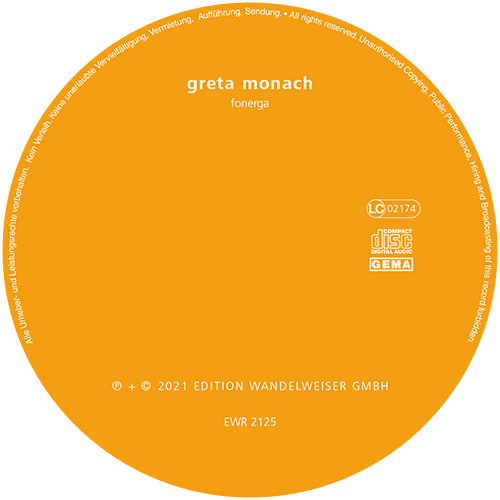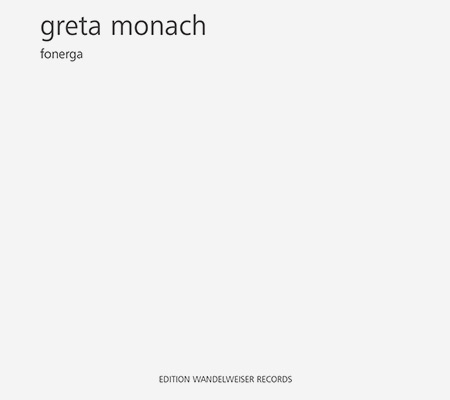EDITION WANDELWEISER RECORDS
> CD catalogue
>> greta monach
_____________________________________________________________________
<< >>
greta monach
fonerga
| order
reference: medium: composer: performer: |
EWR
2125 CD greta monach christopher butterfield, cathy fern lewis, laura brandes, daniel brandes (voices) |
| |
|

|
 |
|
>> squidsear.com audio excerpt: ► fonergon 78-1 (10:06) ► analysis 78-3 (03:07) ► polar bear eats ostrich (04:55) greta monach (1928-2018) fonerga 01 fonergon 78-1 02 analysis 78-3 03 fonergon 79-5 04 polar bear eats ostrich 05 fonergon 85-1 performed by: christopher butterfield, cathy fern lewis, laura brandes, daniel brandes greta monach (greta vermeulen) was born in 1928 in the hague, netherlands. she spent her childhood in indonesia and curaçao. in 1946 she returned to the hague. she saw abstract painting for the first time, and started to think about abstract (non-semantic) poetry. for decades she experimented without success. from 1946 to 1948 monach studied literature at leiden university, then switched to music. she studied the flute for seven years at the royal con- servatory in the hague. from 1955 to 1961 she worked in classical music, including chamber and symphonic music, opera, and oratorio. in 1961 she attended the darmstadt summer course for the first time, exploring contemporary classical music. "contemporary music" opened a new world to monach, and in the years that followed she gathered experience in this field, living in munich at the time. in 1965 she was back in holland, where she studied electronic music. from 1966 to 1986 she held a job at the institute of sonology in utrecht and got familiar with computer music. from 1970 on she used the computer to generate concrete poetry (letter-drawings called "automaterga"). monach is perhaps best known for her series of "fonerga", notated sound poems for one to four voices. each comes with a detailed set of instructions for the speakers regarding pronunciation, tempo, dynamics, and rhythm. she was explicit that they not be considered as music, and not performed in any musical context. greta monach died in 2018 at the age of 89. a note about analysis 78-3 in october 1978, greta monach attended the 11th international sound poetry festival in toronto, canada. she wrote analysis 78-3 shortly before the festival. the piece is made up of syllables found in the phrase "many poets came to toronto and saw no eskimos." the full phrase itself is spoken only once, at the very end. given canada’s journey of reckoning, truth, and reconciliation, and the historical misuse of the word "eskimo" and other harmful labels and stereotypes, we put serious thought into whether to include this piece on the rec- ording. we had conversations with each other and with karla point / hii nulth tsa kaa, indigenous resurgence coordinator in the university of victoria’s faculty of fine arts, and came to the decision to include analysis 78-3, but with a responsibility to provide this broader context. all of greta monach’s sound poetry is remarkably playful in its seriousness (which is part of what we love about it). through analysis 78-3, greta monach comments on the absurd expectations of non-canadians visiting the country for the first time and expecting to be freezing cold and see polar bears and igloos (even in toronto in october!). we have included this short piece in the spirit of both respect for greta monach’s work as an artist, and acknowledgment of the work of decolonization that we also take on as performers. christopher butterfield,
laura brandes, daniel brandes and cathy fern lewis
|